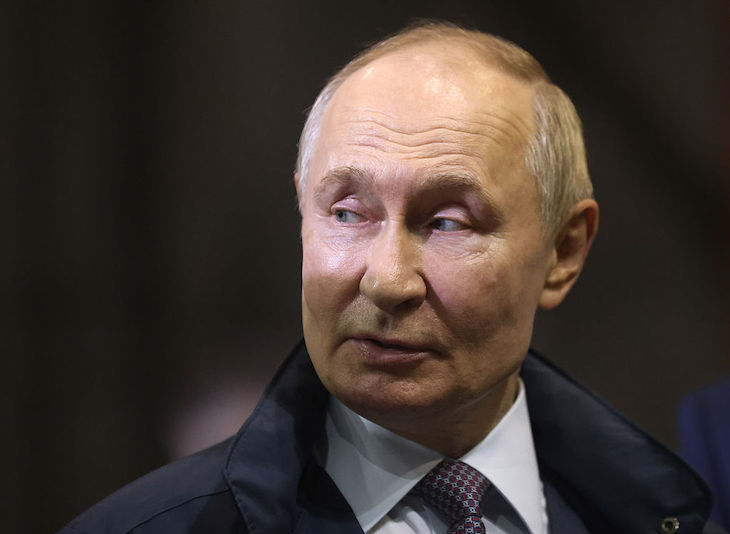Has the world turned upside-down? Russia’s former president Dmitry Medvedev, generally known for his toxic social media posts packed with threat and vitriol, is turning down the volume, while various Western public figures are determinedly turning it up.
Yesterday, German chancellor Friedrich Merz, in what he called ‘a sentence that may be a little shocking at first glance,’ stated that ‘we are not at war, but we are no longer at peace either.’ Actually, this was relatively mild. Meanwhile, Polish prime minister Donald Tusk was describing the current confrontation between Europe and Russia as a ‘new type of war’ at the opening of the Warsaw Security Forum. Likewise, on Sunday’s episode of Lord Speaker’s Corner, a podcast that could rarely be described as a geopolitical must-listen, Baroness Manningham-Buller, director of MI5 until 2007, said we may be ‘already at war with Russia. It’s a different sort of war, but the hostility, the cyberattacks, the physical attacks, intelligence work is extensive.’ No wonder the media is suddenly full of overheated talk of the inevitability and even imminence of World War III.
Meanwhile, of all people, Medvedev took to Telegram to play down the danger of direct conflict: ‘Scenarios of a war with Russia in the next five years are peddled to people from every newsstand in Europe. It just cannot be,’ even if he did acknowledge that ‘the likelihood of a fatal accident happening always exists’ so it was important to remain vigilant. After all, ‘such a conflict is fraught with an absolutely real risk of escalating into a war using weapons of mass destruction.’
In part, this is a reflection of the limitations of our language. War is properly considered to be outright armed conflict between nation states, and there is still very little likelihood of that. All sorts of new formulations have emerged to try and describe the current conflict between Russia and the West, one in which both sides are using a variety of instruments to try and coerce and subvert the other, from sanctions to disinformation. Hybrid warfare, political warfare, non-kinetic warfare, even grey zone warfare, whatever that is really meant to mean: all these ‘new types of war’ of ‘different sorts.’
Scholars can play with these terms – and I’ve done it myself in my book ‘The Weaponisation of Everything’ – safe in the knowledge that these terms are fully explained, buttressed by literature reviews, fortified by footnotes. We also don’t really matter, truth to tell. When public figures talk in these terms, though, their words are inevitably sampled for the most exciting soundbites, short of context and caveat. And they know that. And that’s the point.
Both Russian and Western political establishments are turning to the w-word for their own political ends. Moscow is having carefully to calibrate its rhetoric. Foreign minister Sergei Lavrov, speaking at the UN last week, presented the ‘crisis in Ukraine’ as being provoked ‘by the West, through which Nato and the EU have…already declared a real war on my country and are directly involved in it.’ In this, he was simply echoing Putin who, as far back as his Victory Day speech in May 2023, claimed ‘a real war has been unleashed against our Motherland.’
Baroness Manningham-Buller, ex-director of MI5, said we may be ‘already at war with Russia’
As the economic costs of the war begin to mount, with VAT set to rise from 20 per cent to 22 per cent and a series of indirect taxes also increasing, invoking war is regarded as a means to make this palatable. Yet at the same time, the Kremlin is aware that there is disquiet about the dangers, as petrol supplies are rationed and Ukrainian drones range deeper and deeper into the country, and hence the need for interventions such as Medvedev’s which try to moderate the fear of some catastrophic escalation.
Meanwhile, as Trump wishes Ukraine well but essentially walks away from the war, the costs for Europe are also growing. Although the apparent zeal shared by Keir Starmer and Emmanuel Macron to send in peacekeeping troops seems unlikely to bear fruit, nonetheless this is now a war fought by Ukrainians and bankrolled by Europeans, at a time when the pressures on everyone’s economies are keenly felt. Hence the need to push the message that, even if so far the main costs have been airport delays and demonstrative but essentially trivial Russian airspace violations, this is our war, too.
Yes, there is a real threat from Russian subversion and sabotage, but is it as apocalyptic and existential as the w-word suggests? To Merz, Russia is waging ‘a war against our democracy and a war against our freedom,’ even if one could argue that the real threats to freedom and democracy tend to be rather closer to home. Tusk in effect let the cat out of the bag, saying that ‘the biggest and most important task for European leaders today is to make Western societies aware that this is war.’ In other words, everyone needs to be scared straight, so they – like their Russian counterparts – accept the price to be paid.








Comments